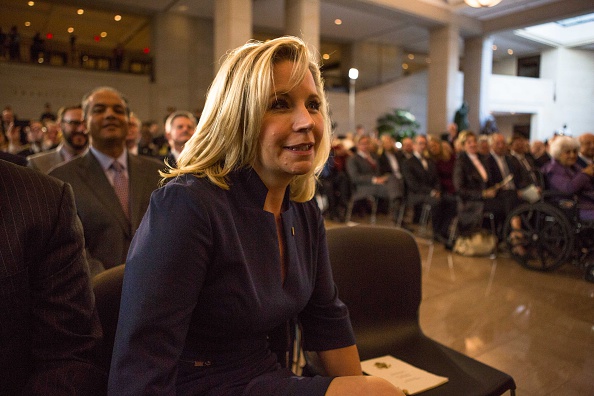
Liz Cheney isn’t giving up.
After stumbling in her bid to become a senator in 2014, the daughter of former Vice President Dick Cheney was back making the rounds at the Wyoming Republican Party’s state convention in hopes of becoming the state’s sole member in the House of Representatives. In a year when anti-establishment fervor is at a peak, Cheney is balancing the benefits and burdens of her famous last name.
“Not everybody likes Dick Cheney, I don’t know if you know that or not,” Cheney told the audience of Wyoming Republicans, when one inquired about the former Vice President’s health. “He’s doing great, thanks for asking,” she answered, adding he’s spending much of his time driving her daughter Grace to rodeos in the state. Continuing the story, Cheney said another child once taunted her daughter about her grandfather.
“Gracie didn’t miss a beat,” Cheney retold, speaking at a luncheon she sponsored for delegates to the state’s GOP convention. “She said that kid doesn’t know anything—he drives a Prius.” The line drew guffaws among the Republicans in the energy-heavy state.
Politics for the Cheneys is a family affair. The former Vice President held the seat she hopes to occupy for a decade in the 1980s. Liz Cheney’s children, including Grace—who skipped a rodeo to come—worked the convention in matching t-shirts and hats, handing out pamphlets and stickers to delegates.
Cheney’s first effort at statewide office—a primary challenge to incumbent Sen. Mike Enzi—ended before a single vote was cast. Branded by some as a carpetbagger (she lived in Virginia and worked in Washington, but grew up in Wyoming), Cheney’s decision to run against a member of her own party rubbed many Republicans the wrong way.
But whatever bitterness was there has since subsided, as Cheney has barnstormed the state. She is now the front-runner to replace Rep. Cynthia Lummis, facing off against as many as 10 GOP rivals in the state’s Aug 16 primary. On Friday, Cheney reported raising more than $730,000 for her effort since she launched her campaign in February—far out-raising her chief rivals—with more than $600,000 on hand. Her campaign bragged that “she didn’t accept one dollar of PAC money from Washington, D.C.”
Asked by a supporter how she’d help the state from her first day in office, Cheney avoided highlighting her tenure as a top State Department official in the Bush administration, instead defusing the question with a joke.
“I’m not going to have to spent time trying to figure out where the men’s room is,” she quipped.
But even in the deep-red state, some Republicans have their doubts about the family name. Cheney was challenged by one resident about a New Jersey-based energy company with interests in Israel on whose board her father serves. The candidate was asked whether she’d use U.S. military force to further the company’s interests, prompting an angry response.
“I resent the accusation,” Cheney said, added it was not the “politically correct” response to the question. “I don’t know what company you’re talking about. It doesn’t involve me. The notion that I, or anybody in my family, would somehow make decisions about this nation for personal profit is a Democratic talking point.”
She continued to heap praise on her father.
“There is not a single person that I know in public life who is—certainly alive today—who has shown more courage and conviction to do what is right for this nation than Dick Cheney,” she said, as most of the GOP activists in the room applauded.
But she was unafraid to criticize the administration her father helped lead, saying it failed to sufficiently curtail the Environmental Protection Agency’s regulations.
“The Bush administration didn’t always get it right on the EPA,” she told delegates.
Cheney was also asked whether she would follow Lummis in joining the House Freedom Caucus, the archconservative group of lawmakers that helped force Speaker of the House John Boehner from his job last year. Cheney was noncommittal, saying she wouldn’t make a decision until she arrived in Washington.
More Must-Reads from TIME
- Inside Elon Musk’s War on Washington
- Meet the 2025 Women of the Year
- The Harsh Truth About Disability Inclusion
- Why Do More Young Adults Have Cancer?
- Colman Domingo Leads With Radical Love
- How to Get Better at Doing Things Alone
- Cecily Strong on Goober the Clown
- Column: The Rise of America’s Broligarchy
Contact us at letters@time.com